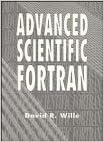Fortran Wiki
Advanced Scientific Fortran
By David R. Willé (1995). Wiley.
Description
Covering topics and issues usually left untouched by standard introductory texts, this book provides a stepping stone to better, more portable and more efficient Fortran programming. It illustrates, in a clear and coherent style, some of the more advanced techniques and facilities of the language, showing how it can be used more effectively to solve practical problems involving heavy numerical computation. For programmers and students with a basic working knowledge of Fortran, the book provides an under-one-cover introduction to the principles and practice of scientific and numerical computing from the basics of programming techniques and style and a general discussion of mathematical software, to a detailed examination of the difficult issues which are key to more efficient Fortran programming. A thorough treatment of the subject of memory management (perhaps one of the most important determining factors for program efficiency) includes the topics of cache and paging, as well as extensive references to linear algebra, the BLAS and LAPACK. Motivated by practical programming issues rather than traditional language tuition, the book is enhanced throughout by many useful examples, with exercises and a collection of fully worked solutions adding breadth. It concludes with a brief description of the new standard, Fortran 90, and an overview of High Performance Fortran, laying the foundations for further exploration of the potential of this important and successful language.

